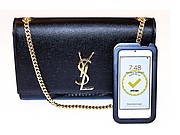TECHNOLOGY
Entrupy Expands Its Reach to Combat Counterfeit Goods
With counterfeit goods estimated to carve out $461 billion in global trade, technology firm Entrupy has an anti-counterfeiting solution that proves authenticity for luxury resale outlets and decreases return fraud.
New York–based Entrupy started gathering data in 2012 on the authentic characteristics of Louis Vuitton monogrammed canvas handbags. The company eventually grew to include a roster of 15 luxury brands whose products it’s able to authenticate today.
“We’ve spent a lot of money on counterfeits and shopping at the brands themselves as we built the data sets to train the algorithms,” said Deanna Thompson, director of business development. “We have data collectors all around the world who have fed us more information.”
With the release of its technology in 2016, the company introduced its iPod-enabled tool, which uses the device’s microscopic camera lens to take images of the smallest details only featured on authentic handbags and certain accessories from different luxury brands. Today, Entrupy is able to authenticate goods from Balenciaga, Bottega Veneta, Burberry, Celine, Chanel, Chloé, Coach, Dior, Fendi, Goyard, Gucci, Hermès, Louis Vuitton, Prada and Yves Saint Laurent/Saint Laurent.
Clients pay a one-time $299 setup fee for a device that Entrupy will send, in addition to a subscription rate that ranges from $99 to $599 a month, $950 to $5,750 a year, or a customized Enterprise subscription for resellers who do high-volume authentications. (Hermès pieces are subject to a different pricing structure and could incur a longer authentication time.)
Once clients are ready to use the device, they are led through prompts to take pictures of different product features such as the logo, outer materials and inner fabric. Users can also include the product’s serial number and an internal SKU, if available.
“If you don’t have a serial code, it’s okay as it’s only one of the factors. We’re just not looking at one thing on the item. It’s not just the stitching or the logo—we’re taking everything into consideration,” Thompson said.
After all pictures are generated, users ensure the files are usable and submit the product information for authentication. After waiting 60 seconds to 60 minutes for the device to either verify authenticity and generate a certificate for the item—or report that the piece is counterfeit—a client is able to decide whether or not to add the product to its inventory. Entrupy is so confident in its 99.1 percent accuracy rate that the company will purchase a piece from a client if the product is incorrectly authenticated.
Founded by Mark Schechter in 2013, Tustin, Calif.’s Ideal Luxury is aconsignment and short-term lending business that specializes in premium goods. As a trusted reseller and lender, who deals in Louis Vuitton, Chanel and Hermès, Ideal Luxury has built a reputation as a business that not only resells but also offers authentication services for customers who want to ensure their goods are real.
“As we started seeing more and more bags come in, it was important that we could authenticate them,” Schechter said. “We needed to make sure we had a bona-fide product so in the event that we were reselling or there was a loan default we knew that we had an authentic bag that we could promote, sell and put our name on.”
Schechter compares Entrupy’s offerings with a jeweler’s loupe used to examine jewelry and watches. He feels the company’s certification for handbags is comparable to the Gemological Institute of America’s gem expertise.
“Entrupy is doing the same thing with much more advanced technology. It takes that highly magnified photograph and compares it to a very particular database,” Schechter explained as he described how Entrupy had helped him purchase and sell bags that cost well into the five-figure price range.
“When you take something of quality and you look at it under great magnification, you’ll either confirm its quality or the weaknesses will be exposed,” he said.
Growing from approximately 80 to more than 500 authentication clients globally since 2016, Entrupy has processed more than 45 million product images and secured $90 million in customer inventory. Following the influx of luxury donations to its site, ShopGoodwill.com in November partnered with Entrupy.
“They were having the same authentication issues that any resale company would have,” Thompson revealed. “They weren’t hitting the numbers they thought they should and it was all due to authentication.”
During the latter part of 2019, Entrupy will expand its authentication reach when it introduces services for examining other high-end fashion items. At the moment, the brand is still riding on the momentum from the September launch of its fingerprint technology.
“The fingerprinting technology works for everything else we don’t authenticate. It’s great for retailers or anyone who is worried about counterfeiters entering their supply chain,” Thompson explained. “You take one image—a label on clothing or a logo on a watch—ship out the product and if it comes back [as a returned item] we can tell you 100 percent whether it’s the same item or not.”
Without adding any security tags, such as those used for RFID systems, Entrupy helps retailers ensure returned items originated with a retailer and not through a counterfeit operation.
“The way it will be done with major retailers will be in the warehouse, starting small, when an item is packed and shipped, it will be fingerprinted,” Thompson explained. “Then the fingerprint can be taken at the point of sale so when someone returns it, just take that fingerprint and you know whether to process that return or not because return fraud is massive.”






















